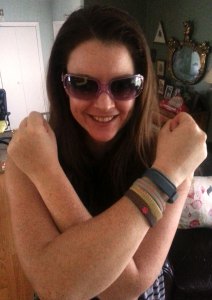You know that restaurant you go to once a year because you can’t quite remember why you don’t like it, so you think to yourself “It can’t possibly be as bad as I think it was!” Then you go…and you remember “Yeah, it’s that bad and then some.” You say to your spouse “Honey, if I ever suggest we come here again can you please remind me how bad it was?”
Well, I’m having that kind of sudden bad-memory-recall with a medication change. Why, oh why did I listen to the doctor’s suggestion? It’s my body and I knew better.

This image is from my Fitbit sleep tracker. Note over 30 days without HRT how much more restless my nights have gotten even though I’m in bed for the same amount of time.
The super-short version of what is wrong with me (in this situation) is that I’m post-menopausal and have been for the past 5 years. Yes, apparently my now 15-month-old son is a complete fluke of nature (another story.) I’ve been on Hormone Replacement Therapy (HRT) to relieve yucky symptoms such as horrible hot flashes (24 hours a day), completely irregular blood sugar readings, vertigo, trouble sleeping, joint pain, bleeding gums, weight gain, etc. When I’m taking HRT, “Badda-bing!” I’m completely normal again…all symptoms go. When I’m not, well obviously from the laundry list of symptoms, I’m pretty miserable.
A few months back I started having other female issues and the obgyn discovered a uterine fibroid that will have to be surgically removed (again, another story) but right before she found it she suggested that I go off of HRT just to see what would happen…to see if something had changed. Gah! I’d already had all these conversations with my NP but my medical team doesn’t communicate and I honestly think the obgyn just wanted to cover her bases. Nevertheless after listening to “If it was my body, I’d do it” and “What’s the worst that can happen? A few hot flashes?” I reluctantly agreed.
It’s been a month and all I have to say is “Never again!” After all, my obgyn isn’t me. She doesn’t have a myriad of other conditions to worry about, all of which are affected by drastic hormone changes. She doesn’t really get type 1 diabetes or understand what I mean when I say “My BGs are really hard to control when I’m having all those menopause symptoms, not to mention that some of them mimic symptoms of low BG and it’s a real challenge.” So, why on earth did I get talked into doing it again when I knew that wasn’t the issue? Maybe I felt guilted into it? Maybe, for once, I just wanted to be that round peg that actually fits into the round hole? Maybe I simply let myself forget just how bad that restaurant was? Regardless of the reason, for the next few weeks at least, I’ll be consciously only hugging my husband while I’m facing to the right because leaning my head back and looking left is guaranteed to bring on the vertigo.
You might also be interested in these related posts:
My Fitbit Flex: A Delightful Surprise
Is Type 1 Diabetes Different for Women than it is for Men?
Synthetic Hormones and Type 1 Diabetes: A Call For Sharing Personal Stories
First Things First: Hormones and Insulin Requirements





